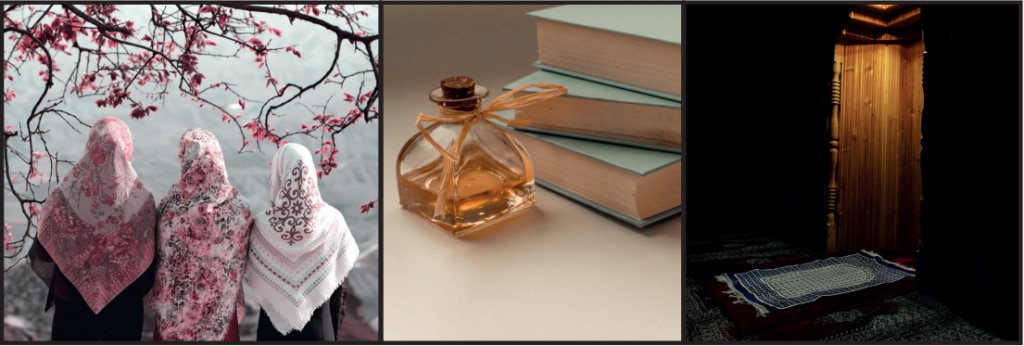Awwab Saad Hayat, Al Hakam

The Holy Prophet Muhammadsa said:
حُبِّبَ اِلَيَّ مِنْ دُنْيَاكُمْ ثَلَاثٌ۔ اَلطِّيْبُ وَالنِّسَائُ وَقُرَّةُ عَيْنِيْ فِي الصَّلٰوةِ
Meaning, “In your world, women and perfume have been made dear to me, but the delight of my eyes lies in salat [prayer].” (Sunan al-Nasa’i, The Book of the Kind Treatment of Women)
This statement of the Holy Prophetsa does not refer to the fundamentals of faith or Islam – they contain in them deep wisdom and reveal the compassionate and beautiful nature of Prophet Muhammadsa.
An incorrect understanding by Sir Muhammad Iqbal
On 30 December 1915, the famous Sir Muhammad Iqbal wrote a letter to Maharaja Sir Kishen Pershad – an Indian noble who was the Prime Minister of Hyderabad. He wrote:
“In London, an Englishman asked me if I was a Muslim. I said, ‘Yes – I am one-third Muslim’. Surprised, he asked how so. I said the Messengersa of Allah had said: ‘In your world, three things are dear to me; salat [prayer], perfume and women.’
“I, however, only like one of these three things. Nevertheless, this thought [of Prophet Muhammadsa] deserves praise in that the Holy Prophetsa spoke of women [Sunan al-Nasa’i] in reference to two subtleties. The reality is that women are the fragrance of the law of nature and the prayer of the heart. […]” (Iqbal banam Shad, by Muhammad Abdullah Qureshi, p. 150, published by Bazm-e-Iqbal, Lahore)
The correct meaning of this hadith was related by Hazrat Mirza Bashiruddin Mahmud Ahmad, Khalifatul Masih IIra, who explained:
“Humans are commanded to love God Almighty, but God does not only say this, rather He says to love His creation as well. Thus, the Holy Prophetsa was proud that he liked three things and held them as the dearest. He said he loved perfume, women and salat [prayer]. If one reflects, the Holy Prophetsa possessed complete love for these three things and his love was so deep that no parallel can be found in any religion other than Islam.
“Teeb means fragrance and cleanliness and before the Holy Prophetsa, no religion emphasised cleanliness with the intensity that Islam did. Previous religions thought it was a great [spiritual] achievement if a person was physically unclean and dirty. To this day, many priests do not clip their nails and the more dirt that is present under their nails, the closer to God they are seen to be. They do not bathe for years on end. However, the Holy Prophetsa said teeb – cleanliness – is essential and he would practically exemplify this himself and loved cleanliness.
“Then he said he liked women. Here, the Arabic word nisa [women] is used, not azwaj [wives]. In other words, it is not referring to wives, but rather women in general. And he is stating that ‘no other religion took care of the rights and spoke of the benefits of women in the way I did. Previous religions have suppressed the rights of women and no one is empathetic about them – however, I will establish their rights and take care of their success in the same way as men.’
“Then he said, ‘قُرَّةُ عَيْنِيْ فِي الصَّلٰوةِ’ – the delight of my eyes has been put in salat [prayer]. This is another special distinction between Islam as compared to other religions. There is no other nation in the world that possesses consistency of worship like that of salat[prayer]. All previous religions laid focus on apparent physical acts of worship or the time gap between each worship was so long that spirituality fell weak. However, it is only the religion of Islam in which its followers are called to worship five times a day – there is no other religion like this. Christians and Hindus go to worship once a week – some of them may worship day and night; however, here I am talking about collective worship. The commandment to worship collectively, many times a day, was only given by the Holy Prophetsa. Salat also means ‘to pray [in general]’ and in this manner, the Holy Prophetsa emphasised the importance of prayer.
“The worship of other religions has stressed the apparent and physical elements and through those actions, they try to attain pleasure in worship. For example, in the Aryan faith and Christianity, they play music. However, the Holy Prophetsa said that ‘I have been given such worship which possesses pleasure within it and no other religion can match the pleasure it provides.’
“Thus, this is the love that the Holy Prophetsa was bestowed. Now, was the Holy Prophetsa a disbeliever [God forbid] because he loved perfume, women andsalat? Certainly not! […]” (Anwar-ul-Ulum, Vol. 8, pp. 606-608)

